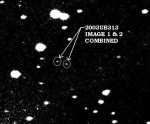Cambridge astonomer focuses on '10th Planet'

CAMBRIDGE -- A Cambridge man is keeping an eye on what some astronomers believe is the 10th planet in our solar system.
As his e-mail to the Gazette indicates, however, the subject is far from settled.
Linderholm submitted photographs of the celestial body that is the center of the controversy.
"Here are 2 images I took recently of the so-called 10th Planet, and one combined image showing the relative motion of this planet in about 22 hours.
"The present designation of the planet is 2003UB313, but the discoverer wants to call it Xena. This planet was discovered by the Samuel Oschin Telescope at the Palomar Observatory near San Diego, Calif., on Jan. 8, 2005. It is larger than Pluto, but much farther away -- presently more than 14 billion kilometers from Earth.
"The images shown are about 7 minutes wide and, for comparison, the moon is about 30 minutes wide. Being so far away, it is difficult (for me) to get images of the 10th planet. The accompanying images were taken here at Lime Creek Observatory (IAU#721) using a CCD camera / telescope and are 1,200 second exposures. Note that the relative motion is very small due to the distance to the planet.
"Some astronomers will object to adding another major planet to our solar system and, in fact, some astronomers don't think that Pluto should be classified as a major planet. However, it's likely that school books in the future will list our solar system has having 10 major planets, with Xena being the 10th.
"I should add that the name "Xena" is presently under both consideration and some suspicion. This planet also has a moon dubbed Gabrielle so, as you can see, some rather light-hearted bickering is going on regarding the names.
"Whether or not Xena and Gabrielle should forever be locked in gravitational embrace is a moral question and beyond the scope (pardon the pun) of this observatory."
